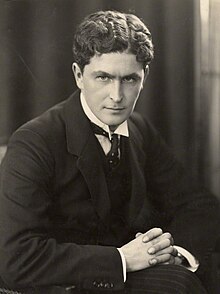Frank Kingsley Griffith
| Frank Kingsley Griffith | |
|---|---|

Kingsley Griffith circa 1915
|
|
| Member of the United Kingdom Parliament for Middlesbrough West |
|
| Preceded by | Trevelyan Thomson |
| Succeeded by | Harcourt Johnstone |
| Personal details | |
| Born |
23 December 1889 Upper Norwood, Surrey |
| Died | 25 September 1962 (aged 74) |
| Political party | Liberal |
| Spouse(s) |
1st, Eleanor Bruce 2nd, Margaret Louch |
1st, Eleanor Bruce
Frank Kingsley Griffith (23 December 1889 – 25 September 1962) was a British Liberal Party politician, barrister and County Court judge.
Griffith was born in Upper Norwood, Surrey, the son of an army officer. He was educated at Marlborough and Balliol College, Oxford. In 1912 he was president of the Oxford Union. Griffith served in the army throughout the Great War first in the Gloucestershire Regiment and then the Lincolnshire Regiment, attaining the rank of Captain. He was wounded twice and was awarded the Military Cross. In 1915 he was called to the bar by the Inner Temple and after the war he joined the North-Eastern Circuit.
Griffith was one time chairman of the National League of Young Liberals. He was well known as a good platform performer in politics and for being an outstanding young thinker ranked alongside the likes of Elliott Dodds. He contested the Bromley division of Kent for the Liberal party in the general elections of 1922, 1923 and 1924 being unsuccessful on all three occasions.
By 1927, Griffith was so well thought of in Liberal circles that he was appointed to the Liberal Organizing Committee under the Chairmanship of future party leader Herbert Samuel along with other party luminaries such as Archie Sinclair another future leader. In March 1928 he was adopted as candidate for the by-election in the Liberal seat of Middlesbrough West which he held in a three cornered contest. The deceased Liberal incumbent, Trevelyan Thomson, had been so entrenched in the seat that he had been unopposed at the previous general election. However Labour put up a strong challenge against Griffith at the by-election, losing by just 89 votes. Griffith got 36.3% of the poll, compared to Labour’s 36% and the Conservatives’ 27.8%. Griffith fought mainly on the traditional Liberal stance of Free Trade but also called for a programme of public works together with social reform and industrial reconstruction. This platform anticipated the Liberal election manifesto of 1929 based on the ‘coloured’ books of David Lloyd George and the economic models of John Maynard Keynes. In fact Lloyd George turned up to speak for Griffith in the campaign, as did Herbert Samuel. In 1931-32 Griffith was parliamentary private secretary to Sir Herbert Samuel, by then the Home Secretary and Liberal leader.
...
Wikipedia
